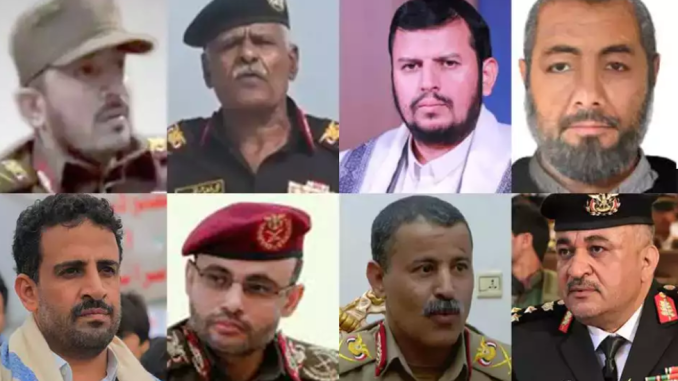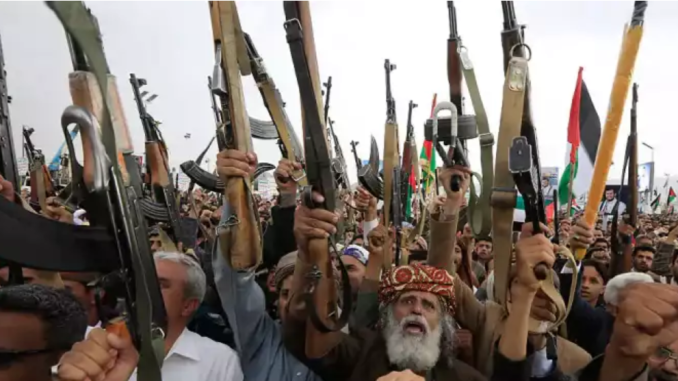Disrupting shipping in the Red Sea has shut down Israel’s Eilat Port and inflicted severe economic damage on Egypt, whose economy relies heavily on revenue from the Suez Canal. This harm to Egypt could destabilize President Abdel Fattah el-Sisi’s regime, with broader consequences for regional stability. Furthermore, the Houthis’ ambitions extend beyond Egypt, targeting Saudi Arabia, the UAE, and even Jordan.
Named after their founder Hussein Badreddin al-Houthi and also known as Ansar Allah (“Supporters of God”), the Houthis are a terrorist organization rooted in Yemen’s Zaidi Shiite minority, which constitutes roughly 30% of the country’s population. This demographic similarity mirrors Hezbollah in Lebanon, another Shiite minority that wields outsized power in its country.
 The Houthi leadership. Photo: Arab Networks
The Houthi leadership. Photo: Arab Networks
The Houthis capitalized on the collapse of Yemen during the Arab Spring a decade ago, seizing control of the country’s north. With Iranian support, they evolved from a militia into a formidable military force equipped with advanced missiles and drones. Saudi Arabia, sensing the danger, launched a war against them in 2015 but was pressured by the US to agree to a ceasefire.
Although the Palestinian cause holds little genuine interest for the Houthis, they exploit it to bolster their regional influence and rally support across the Arab world, including among Sunni populations. Nevertheless, their stated goals include an uncompromising fight against their enemies in the Arab world, the West, Israel, and even Jews globally.
The US pledged to address the Houthi “nuisance,” but its military actions have been constrained and largely ineffective. Washington appears reluctant to entangle itself in Yemen and risk a broader regional conflict. Similarly, Israel has carried out a few PR-driven strikes on Houthi infrastructure, hoping to deter further attacks. These efforts, however, have proven insufficient. The Houthis operate according to their own logic, and the feeble, inconsistent responses only embolden them. Yemen’s dilapidated infrastructure, including its barely functioning electrical grid, makes such attacks largely inconsequential to the Houthis.
Effectively countering the Houthis requires escalating military pressure while forming a local coalition, akin to the approach used against ISIS. Such a coalition should be built around the 70% of Yemenis who oppose the Houthis, aiming to reclaim northern Yemen and dismantle the Houthi regime.
Southern Yemen is governed by a regime that views the Houthis as enemies. Saudi Arabia and other Gulf states are also eager to expel this Iranian proxy from their backyard. The US must spearhead this regional and international effort, with support from Israel.
Merely targeting the Houthis is not enough; their rule must be toppled entirely.





I agree with Professor Eyal Zisser. While it is true that Iran is the head of the snake and should be Israel’s primary target, the snake’s “tails” can also be a serious threat. That is why Israel must fight Hamas, Hezbollah and the Houthis as well as Iran. If Israel needs to fight Hamas and Hezbollah, which I think all Israelis patriots agree is necessary, then surely we must fight the Iranian snake’s third tail, the houthis, as well.
Houthis are damaging the economy of Egypt that does not seem to care!
What broader conflict?
If Iran and or Houthis are attacked, will China really intervene!
Who else?
A task that seem fit to be met by President Trump and allies. Iran was the linchpin in Obama’s plans on behalf of Iran.
The Iranian Yatholas fate will be that of the Houtis.